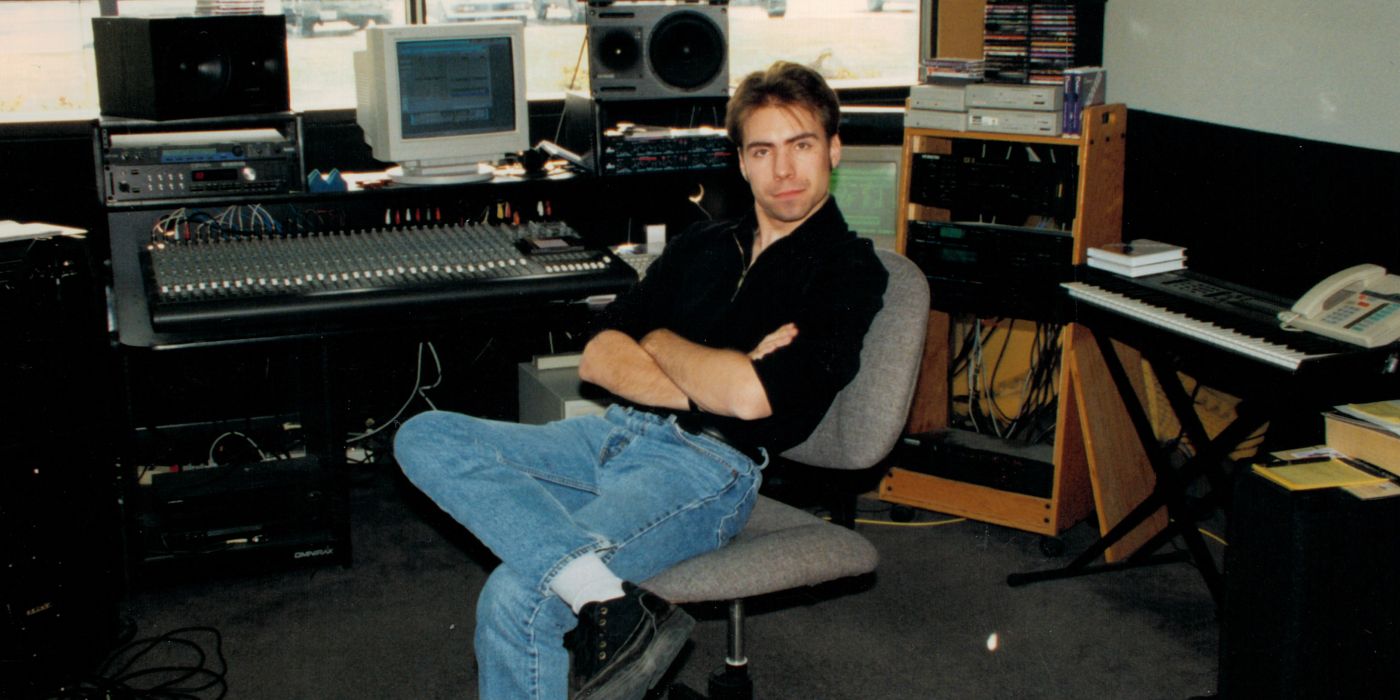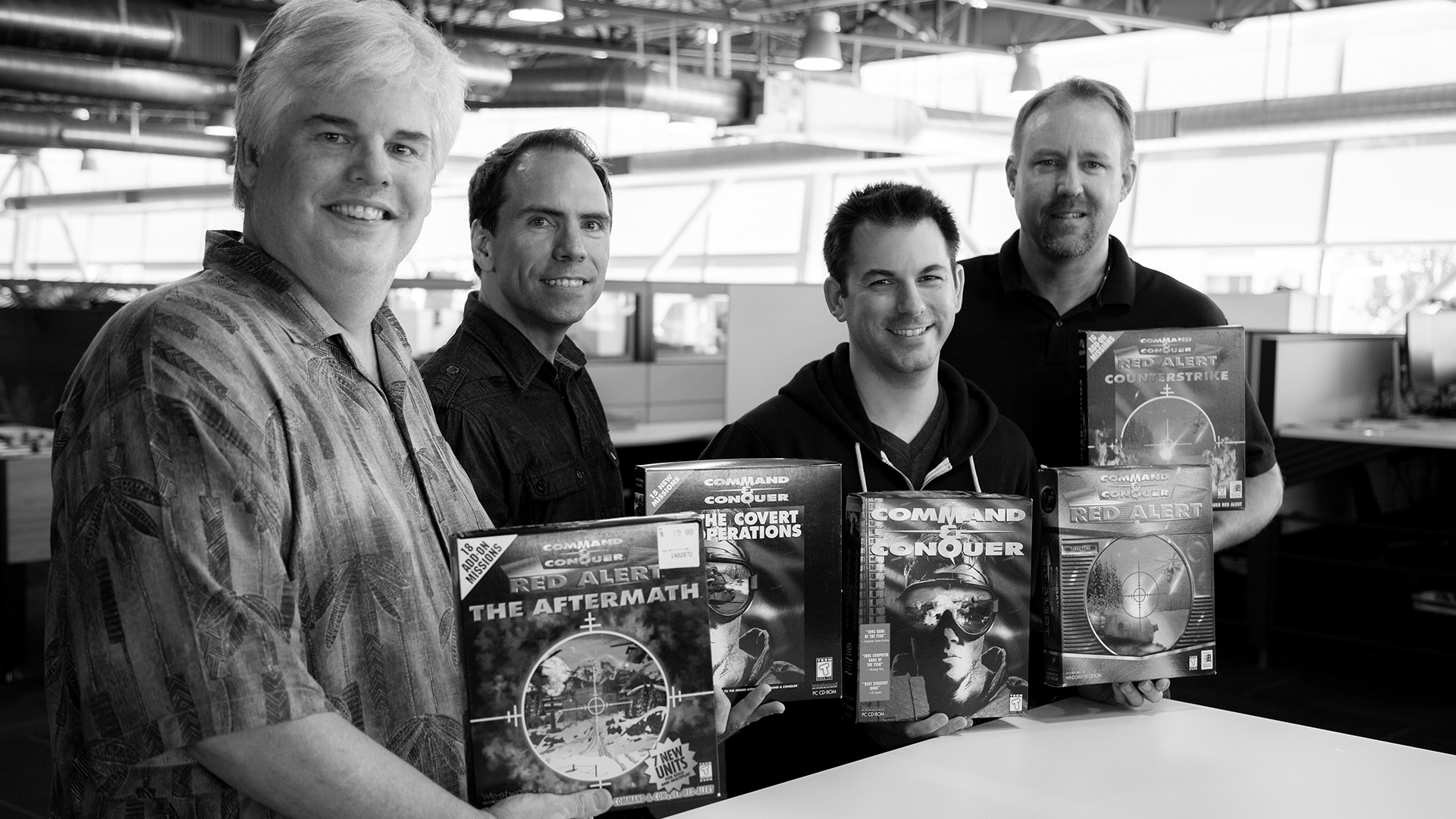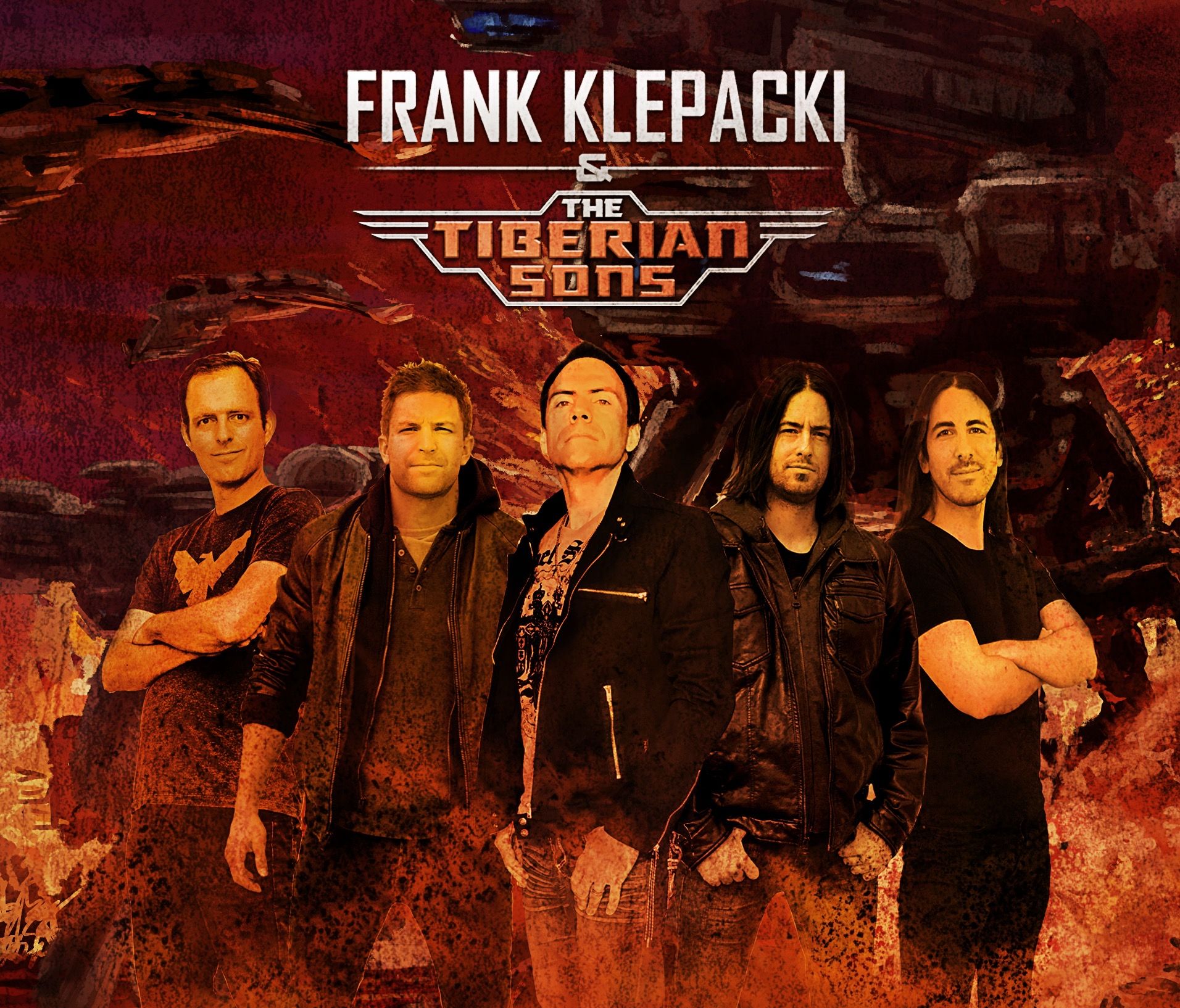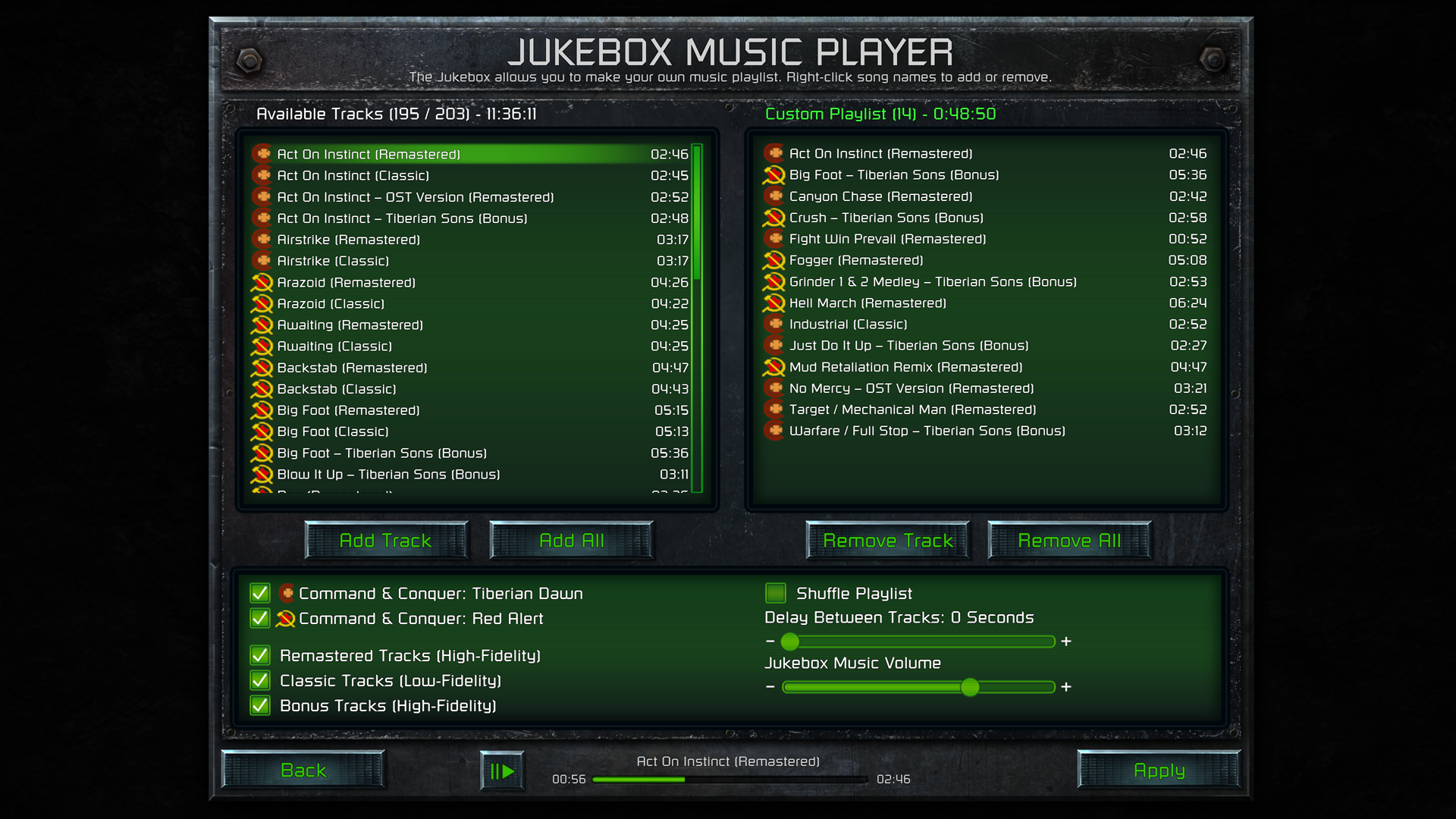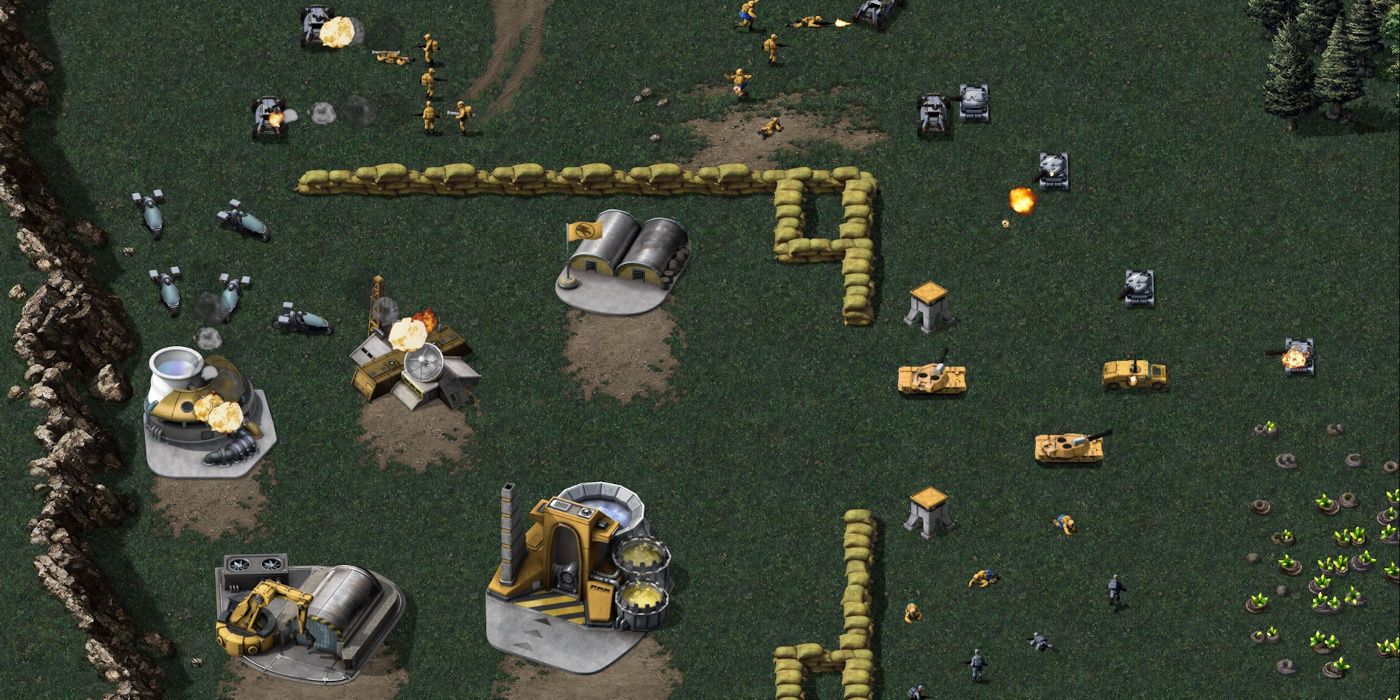Westwood Studios' Command and Conquer was a revolutionary title when it released in 1995, being one of the first real-time strategy games (RTS) on the market. It spawned a franchise that has gone on to this day, branching into a shooter with 2002's Command and Conquer: Renegade and a mobile app with 2018's Command and Conquer: Rivals. The same year Rivals released, EA recruited Petroglyph Games to develop Command and Conquer Remastered Collection, featuring the original game (now subtitled Tiberian Dawn), its 1996 prequel Red Alert, and their expansion packs.
There are also seven hours of remastered music tracks that have been put together by Westwood Studios alumni and Petroglyph Audio Director Frank Klepacki. Klepacki also recorded 20 songs live with the fan-made band Tiberian Sons, all of which is available now through the official soundtrack. Game Rant spoke with Klepacki last week about his experiences creating Command and Conquer, and how things were updated for this Remastered Collection. Interview edited for clarity and length.
Q: You're known for Command and Conquer, but you have a lot more experience with video game music beyond that. How did you get into composing?
A: My parents were performing musicians, so I grew up around that type of environment. Eventually, that got me interested in wanting to learn an instrument. I started with the drums at the age of eight, and by the time I was 11 I was good enough to start performing professionally. So from that point forward I was performing shows in various Las Vegas casinos with my parents.
By the time I got into high school I wanted to start doing more original music, was getting into rock bands, that sort of thing. Then I realized one day I had a hard time communicating ideas to bandmates because I'm only a drummer, so I couldn't tell them what kind of riff or song idea I had in mind. I needed to learn how to communicate with them, and how do I do that? I learned how to play other instruments. So I learned guitar, I learned keyboard.
I was already a gamer, but at this point I started using computers a little bit more to try to mess with putting music into them, and try to record my ideas on four-track recorders and things like that. By the time I got out of high school I discovered Westwood Studios and got a summer job as a tester.
From that excitement, I ended up talking to the audio director, Paul Mudra. He handled all the audio duties at that time. I expressed to him that when I get out of school I'm into music already and I'm a professional performer who writes his own stuff, so if I can intern for you or help out around the office let me know. So gave me a trial period to prove myself by doing some tests with different software they were using to see how well I would take to it, and to see what kind of skill I would bring to the table.
Q: So that was your first professional video game music experience?
A: Yeah, I officially started as a composer at Westwood in 1991, and that was right after I graduated high school.
Q: Once you started working there, how did things wind up on Command and Conquer specifically?
A: Well, what happened was we did a variety of different kinds of games, and I was experimenting doing a variety of different kinds of scores. Most of it was conforming to the technology that was available for those platforms. Starting on the NES, moving up to the SNES and the Genesis, some of the original PC cards that were available for audio playback were the Sound Blaster or AdLib cards, which is what I started on. Actually, you can go back before that and I was working on an Amiga using a program called Dr. T's Music Software.
Anyway, after working on a variety of games we got to Dune II, which was the first RTS game to be released, and from that spawned Command and Conquer because we wanted to do our own IP with that same kind of mechanic. Command and Conquer presented a new technological challenge in that we were utilizing streaming audio for one of the first times. Everything before that was MIDI or FM synthesis, or the occasional sample playback and sound effects, but nothing like full-blown music and dialogue. That was a cutting-edge technology we were utilizing for the game, and of course we had full-motion video.
Q: How did the new technology you were working with change your approach to composing music?
A: In earlier games, the different technologies were primarily MIDI-based. What that means is it was a real-time playback of notes that the computer was spitting out that we had files for, and they assigned that to instruments we told it to play through. So it was either utilizing custom-made FM synthesis instruments or using modules like the Roland MT-32 or the Sound Canvas, and that was primarily how music was being played back from PCs.
When we got to Command and Conquer, we were changing over to audio streaming. MP3 wasn't even invented yet, so we were still using WAV files, but we had to compress those WAV files in order to fit everything else in the game. So we compressed them down to 22K and we played them in mono instead of stereo, but we could still get a sense of what the song was supposed to sound like and how it was created because they were from real audio mixes and not MIDI playback.
Q: In terms of theming, what was the process of coming up with Command and Conquer's music?
A: For the first game I sat in an office roundtable with my audio director and the President of Westwood, and we kicked around a lot of different musical ideas and elements for bands, soundtracks, genres, styles, and instrumentation. I recorded every single one of these ideas and elements onto a cassette tape and brought it back to my office, and then went through it all and started writing and creating things because I was influenced by all of that while bringing my own sensibilities as a composer.
I originally thought the direction would get narrowed down into something after we tried to see what would fit, but in reality what ended up happening was people liked the variety. So we included that, it ended up sticking and being something that magically worked. Thus in Command and Conquer there are a variety of styles: There's orchestral, there's hip-hop, there's metal, there's synth-rock, there's ambient, there's industrial, and everything in between. That was a fun experiment, and it was cool to see that it worked.
When we got to Red Alert, we did refine the sound a bit more. The very first song I wrote for that game was Hell March, which is the main theme of the game. Originally I didn't even know that Red Alert was going to be a prequel, I thought it was going to be a sequel. So I was thinking this would be a cool song for the Brotherhood of Nod, but in fact it was not going to be that at all.
When Brett Sperry, the President, came into my office he said, "Hey do you have anything new to play for me?" I said, "Yeah, I've got this track I'm calling it Hell March." So we listen to it and he's like, "Oh my god, this has to be the theme song for the game." I was just kind of like, "Really? Alright, cool."
The rest of the game was not necessarily a spin-off of that, but we decided we were going to continue in the same sort of modern, industrial sound of Command and Conquer, but refined a bit for Red Alert. It wasn't quite as diverse in that way, but it did have its own sound and tone. Even though it's a prequel that goes back in time we didn't want it to sound dated, we didn't want it to sound like the music of the 1950s or something like that. We wanted it to still be fun and upbeat and have a modern edge.
Q: And from what I understand it was received rather well once you picked that direction. Didn't you get awards and recognition for your work on Red Alert?
A: Yes I did, and I was very surprised by that. Back then the idea of video game music gaining any sort of popularity or awards or fan mail was new to me. I had no idea that such a community of people would be that into it. I kind of wrote it off at first as just die-hards. I was more used to the world of rock bands and stadium tours, I thought that was what people got excited about. Or big, epic movie soundtracks.
That's what I thought people connected the most to, I never thought people would have connected to a video game soundtrack in the same way — let alone a soundtrack that I created. That was a huge surprise and an eye-opener for me.
Q: So we've got Command and Conquer Remastered now. What was the process of translating what you had before like, and how did the in-game music differ from the Tiberian Sons tracks?
A: Obviously the first thing we did upon working on the Remastered Collection was I went to look for all the original source materials and music I could find to make sure we had the highest-quality versions to remaster, equal across the board. It has never been heard before, in its entirety, in high quality. That's something special and I wanted to make sure we found everything.
After we did our [MAGFest] show with the Tiberian Sons, Jim Vessella said, "Hey, I really love what you guys did. Can we figure out a way to include this as a bonus for the Remastered Collection?" I knew the guys would be excited by that so I brought it to them and everyone was on board. We professionally recorded in the studio all of what we did as our live show.
We even threw in an extra track that was fan-chosen, "Just Do It Up" from the original Command and Conquer. We asked the community what their top 10 favorites were and the first nine were songs we were already doing, but the 10th wasn't in our set. So we also recorded that and added it in the game.
Q: Is all of the music in this collection just remastered from the originals? Or is there anything unique to the remaster?
A: Yes to both. All of the original music is there and remastered in high quality. However, along the way there were five tracks that I could not find. They were just missing, lost, don't know where they are, so I had to recreate those from scratch with the original synthesizers and instruments I used in that era so it would be as exact as possible. I mixed it as close as I could.
That was one challenge to overcome, and the other thing that's unique to the remaster is there are bonus tracks never heard by anyone before. They were written for these games but left off because they weren't deemed the right fit at the time. But they still feel like Command and Conquer because they were written for it, and they are included as unlockable bonus tracks in the game.
Q: Was there one particular song that was your favorite to work on?
A: It's hard for me to narrow down favorites because I'm so close to it, and it has been such a part of what my composing legacy is because of the fans. I've definitely got favorites but I change my mind from time to time based on what mood I'm in.
There's also a ridiculous amount of music, the quantity of music that is here is insane. For this Remastered Collection alone, which is Command and Conquer, Red Alert, and their expansion packs, there are 7 hours worth of material.
But you know, a lot of my favorites are still fan-favorites too. I love Hell March, I love Act on Instinct, Mechanical Man. Prepare for Battle is one of my favorites, Demolition is one of my favorites... Red Alert had a lot of fun tracks. I could just keep going.
Q: How did the Tiberian Sons come together and wind up with the MAGFest performance that led to this soundtrack?
A: Many years ago I got an email from a fan named Tony Dickinson, and he was doing his own over-the-top crazy, symphonic version of Hell March for a contest. He thought who better to ask for advice about how this could be improved upon than the original composer? So he contacted me and shared it with me and asked what I thought about it. I listened and was immediately impressed with it, and I said you've already got something awesome here but I would only just advise on how you've mixed it. I gave him a few mixing tips, he submitted it and ended up winning his competition.
We just kind of remained in touch over the years. He, of course, is a professional musician and an outstanding one in his own right, and he put together the Tiberian Sons and did other video game remixes with the same treatment; this very over-the-top progressive rock symphonic hybrid. It was really, really cool that they did that as a passion project and eventually they went on to perform at MAGFest.
He told me all about MAGFest and how cool it was and how I should go. I kept hearing from some other peers in the industry that I should check out MAGFest too, so it was like clearly I need to do this.
I contacted the organizers of the event, and my initial intention was to feel things out and see if I would attend or maybe do a panel. But I figured maybe I could perform there too. So I ran the idea by them about doing a Command and Conquer-related set with a live band, and it would be the first time that's ever been done. They gave me one of the headline slots, so I immediately called Tony and I said, "Hey I need the band for this concert I'm going to do, what do you say?" He thought it was awesome.
The guys were fully on-board and I could not have asked for a better result with how everything came out. They were exceptional, all of them. Connor Engstrom, Max Noel, Travis Moburg, and our visual artist Nate Horsfall did our videos for us. We put on a real, full-on rock concert with this video game music.
Q: How did your experience with Command and Conquer go on to affect other projects?
A: There's something to be said for being allowed to be creative and to try different things, and not try to sound like something else. Command and Conquer was very much about that, and the spirit of what we did at Westwood was very much about that. That's carried over into what Petroglyph does.
It has always stuck with me in my career. Lessons learned from that were more about workflow and efficiency along the way. Command and Conquer specifically, when I first started working on the music I was submitting ideas for approval and what I had to do with the technology at the time was I would come up with the MIDI that played back through the high-quality synthesizers, I would play live guitar and track everything, multi-track, mix it, and then submit it for approval. This was a timely process.
Then I would get feedback like we needed to change something in the mix, we need an edited version for a trailer, and I'd have to restart the whole process just to suit that minimal feedback. I figured this was not very efficient and I had to do something about that.
So, what I did was I utilized samplers in order to record sections of music I would perform live such as on guitar, or loops of drum beats I had sequenced, or things of that nature so I could play those back in real time from the MIDI sequence. That made everything more efficient because I didn't have to worry about tracking everything, I could just play it, mix it on the fly, make the edit, and immediately submit it for approval. That's really what was a game-changer for me, and made how I worked ever since follow that sort of workflow — especially through the Westwood years.
Q: Are there other video game tracks or composers you really like, or that have been inspirational to you?
A: Yeah I mean there's a lot of great talent out there, and soundtracks I've enjoyed over the years. Really though I've always maintained some blinders when I'm working on things. I like to be influenced by what is appropriate for the project, and not try to emulate something else. Again, this is one of the things that stuck with me from the early years.
What I appreciate is the sense of championing each other in the industry. I've had the chance to meet a lot of different composers, guys that I respect and appreciate. We end up having a lot of great conversations and getting to know each other and sharing some industry stuff. At the end of the day I was fortunate enough to find my calling early in life and find a style that ended up being synonymous with what I do, so even though I can do lots of different things I'm very fortunate that fans have responded the way they have, and that this became what it is.
Q: Is there anything else you want to add?
A: Just that I hope everyone enjoys taking a trip down memory lane with us, and appreciates that they are experiencing it in a new way. A way that is something I think has been on many minds in the community for a long time, wanting to see this represented in a modern way. We're doing that.
I'm just very happy that the whole soundtrack collection is finally available in high quality for people to experience, because I know that's something fans have wanted for a lot of years. Now it's finally happened.
Command and Conquer Remastered Collection is available now for PC.

